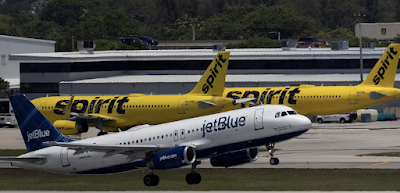Spirit Airlines: Waiting On JetBlue Money

Update - March 6 No surprise the government is looking to block the acquisition by JetBlue. The question is whether the DoJ actually has the right to block the merger. Besides, Spirit shareholders are likely better off without a deal. Regardless, the stock has fallen to the yearly and covid lows as the market apparently doesn't understand Spirit is better off without JetBlue. Regulators are reportedly looking to block the prospective merger between JetBlue Airways ( NASDAQ: JBLU ) and Spirit Airlines ( NYSE: SAVE ), sending shares of the latter sliding. Both the Department of Transportation and Department of Justice are looking to halt the deal on the grounds that the merger would be anti-competitive, according to Bloomberg. Per prior media reports, executives from the carriers met with the DOJ in late February in a "last-rites" meeting to assuage regulatory concerns on the planned merger. That meeting followed reports earlier in February that the dep...